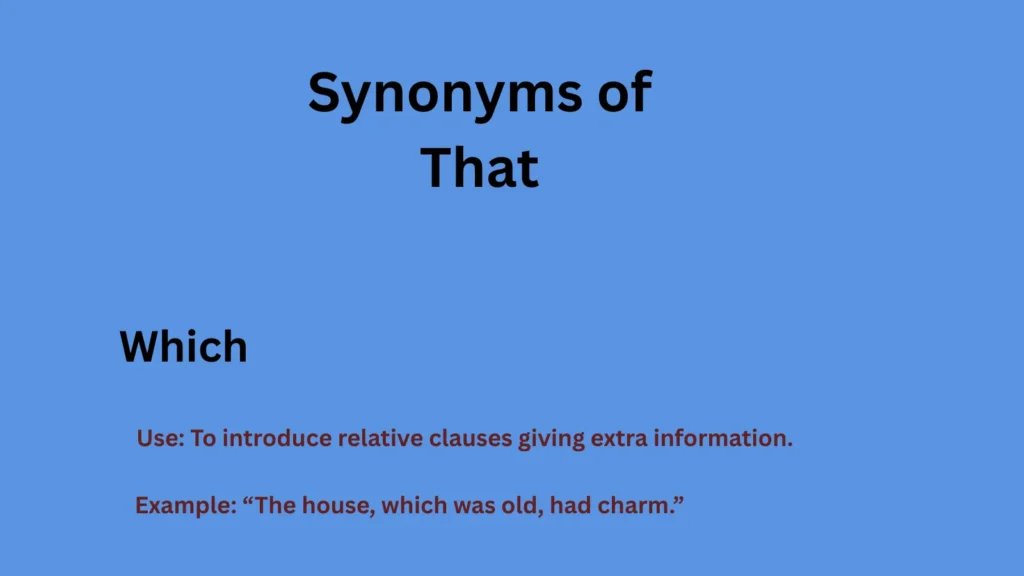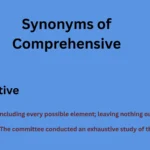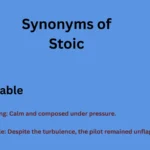Synonyms of that, such as which, who, and the one, provide useful alternatives to avoid repetition and improve clarity in your writing and speech. If you find yourself using “that” too often or want to vary your sentence structure, this article offers 30 carefully chosen synonyms.
Each option comes with a clear meaning, a practical example sentence, and guidance on when and how to use it—whether in formal writing, casual conversation, or technical contexts.
These alternatives help you make your communication smoother and more engaging. Whether you’re writing essays, stories, or business documents, you’ll find the right word to fit your style and purpose.
Understanding “That” — The Modest Pointer
At its core, “that” is about pointing to something specific but usually in a reserved, indirect, or modest way. It doesn’t shout, but gently directs the listener’s or reader’s attention.
- Example: “I like that book you recommended.”
Here, “that” modestly indicates a particular book without drama or emphasis.
When you want to sound neutral, unassuming, or simply referential, “that” fits perfectly. But if you want more emotional weight, formality, or playfulness, you might choose a synonym.
30 Synonyms and Alternatives to That
1. This
Use: To point to something closer or more immediate than “that.”
Example: “This is the key to the problem.”
Tone: More immediate and personal than “that.”
2. Which
Use: To introduce relative clauses giving extra information.
Example: “The house, which was old, had charm.”
Tone: Formal and informative.
3. Who
Use: Referring specifically to people.
Example: “The person who called is waiting.”
Tone: Personal and direct.
4. Whom
Use: Formal, objective case of “who.”
Example: “The man whom you met is my uncle.”
Tone: Formal, traditional.
5. Where
Use: To refer to a place.
Example: “This is the city where I was born.”
Tone: Neutral and descriptive.
6. When
Use: To refer to a time.
Example: “I remember the day when we met.”
Tone: Reflective and specific.
7. Whatever
Use: Indicating anything or a situation, often casual or indifferent.
Example: “Do whatever makes you happy.”
Tone: Casual, sometimes dismissive.
8. Whichever
Use: To express choice among options.
Example: “Take whichever route you prefer.”
Tone: Neutral, offers freedom.
9. Such
Use: To emphasize a type or example.
Example: “Such kindness is rare.”
Tone: Emphatic and formal.
10. The one
Use: To specify a particular item/person previously mentioned.
Example: “The one I told you about is arriving soon.”
Tone: Casual and clear.
11. That one
Use: More specific than “that,” often pointing physically or emotionally.
Example: “I prefer that one.”
Tone: Informal and direct.
12. It
Use: Referring back to a previously mentioned subject or object.
Example: “I fixed it yesterday.”
Tone: Neutral and simple.
13. As
Use: Used to introduce comparisons or reasons.
Example: “She’s brave, as you know.”
Tone: Formal and explanatory.
14. Such as
Use: To give examples.
Example: “Fruits such as apples and oranges are healthy.”
Tone: Informative and clear.
15. Wherein
Use: Formal, meaning “in which.”
Example: “A situation wherein trust is crucial.”
Tone: Formal, academic.
16. There
Use: To refer to a place or situation already mentioned.
Example: “There is the building I spoke of.”
Tone: Neutral and locational.
17. That which
Use: Formal alternative to “that.”
Example: “That which is broken must be fixed.”
Tone: Formal, literary.
18. Whatever it is
Use: Expressing uncertainty or indifference.
Example: “Whatever it is, don’t worry.”
Tone: Casual, sometimes vague.
19. One
Use: General reference, sometimes abstract.
Example: “One must be careful.”
Tone: Formal or philosophical.
20. The fact that
Use: To highlight a particular truth or reality.
Example: “The fact that she left surprised me.”
Tone: Emphatic, formal.
21. Hence
Use: Meaning “for that reason.”
Example: “The weather was bad, hence the delay.”
Tone: Formal, logical.
22. Such that
Use: Indicating cause or condition.
Example: “It was such that no one could deny.”
Tone: Formal, descriptive.
23. So
Use: To introduce a result or reason.
Example: “I was tired, so I rested.”
Tone: Neutral, conversational.
24. In which
Use: Formal, specifying place, time, or condition.
Example: “The moment in which she arrived.”
Tone: Formal, descriptive.
25. Whereby
Use: Formal, meaning “by which.”
Example: “A system whereby tasks are automated.”
Tone: Formal, technical.
26. That one there
Use: More precise, pointing out a specific object or person.
Example: “Look at that one there.”
Tone: Informal, conversational.
27. To the effect that
Use: Reporting or paraphrasing.
Example: “He said something to the effect that he was tired.”
Tone: Formal, indirect.
28. Suchlike
Use: Informal, meaning “things like that.”
Example: “We talked about politics, sports, and suchlike.”
Tone: Casual, colloquial.
29. In that
Use: Meaning “because” or “in the sense that.”
Example: “She’s lucky in that she has support.”
Tone: Formal, explanatory.
30. Insofar as
Use: Meaning “to the extent that.”
Example: “Insofar as I know, the meeting is today.”
Tone: Formal, precise.
How to Choose the Right Synonym?
- Tone: Formal writings prefer words like “wherein,” “whereby,” or “that which,” while casual conversations lean toward “that one,” “this,” or “suchlike.”
- Specificity: Use “who” or “whom” for people, “where” or “in which” for places, and “when” for time.
- Emphasis: Words like “such” or “the fact that” add emphasis and weight.
- Emotion: “Whatever” or “suchlike” can express indifference or casualness; “that one there” can add a personal, friendly vibe.
- Clarity: For complex ideas, phrases like “to the effect that” or “insofar as” clarify meaning.
Cultural and Emotional Contexts
In formal or academic settings, synonyms such as “whereby,” “therein,” or “insofar as” show sophistication and precision. In everyday speech, these sounds are awkward or overly stiff. Casual or regional dialects might favor “suchlike” or “that one,” adding a friendly or folksy tone.
Emotionally, choosing a synonym can alter perception: “whatever” may sound indifferent or dismissive, while “such” can highlight admiration or surprise.
Conclusion
“That” is a humble yet powerful word, perfect for modestly pointing out something specific. However, the richness of English offers many alternatives that can subtly shift your tone, clarity, or formality.
When choosing a synonym, consider your audience, context, and emotional intent. Play with these 30 alternatives to enrich your writing and speaking.
With practice, selecting the perfect “that” synonym will become second nature, making your communication clearer, more engaging, and nuanced.


